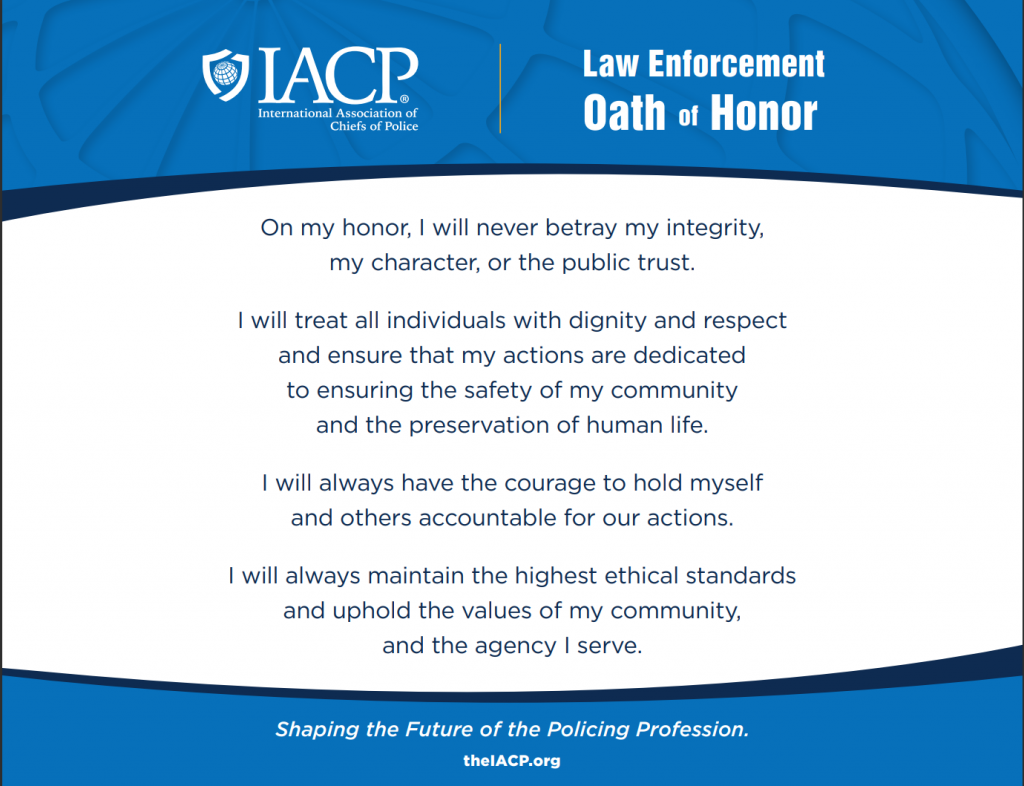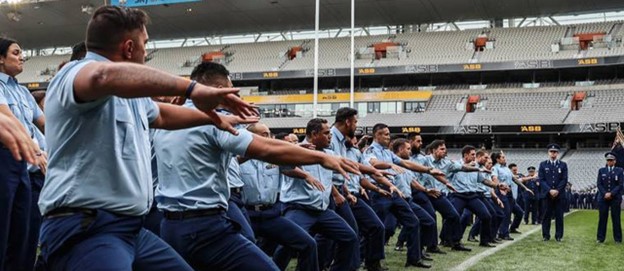Honor, a term deeply ingrained in policing, is a multifaceted concept. It resonates in the mission statements of numerous police departments and is instilled from the start of a police officer’s career, with academy instructors underscoring its significance. For police chiefs and command-level officers, honor is a cornerstone in their interactions with officers and public declarations, adding a layer of complexity to their roles.
Honor has many definitions. One could hold a position of honor to indicate superiority or one whose worth brings respect or fame. The term may also mean showing merited respect, such as when people pay honor to the founders of their country or, on a more personal level, when a child is said to bring honor to their parents.
The International Association of Chiefs of Police (IACP) Law Enforcement Oath of Honor begins with the words, “On my honor…” In this context, honor takes the form of giving one’s word as a performance guarantee. The rest of the IACP Law Enforcement Oath of Honor indicates that the oath taker will do so with a keen sense of ethical conduct and, as a result, will be considered a person of honor.1

For Translations: www.theiacp.org/resources/the-oath-of-honor
Amid the various interpretations of honor in policing, one definition stands out as particularly significant for police chiefs: honor as a verb. In this context, honor signifies the act of regarding or treating someone with admiration and respect and, crucially, living up to the terms of a commitment. This nuanced understanding of honor is a beacon for police chiefs, guiding their actions and shaping their leadership. It goes beyond the job to all aspects of an individual’s life. One cannot live honorably in one context and dishonorably in another—that betrays the conceptual definition of honor. Living a life of honor is a holistic package. A police officer of any rank is expected to demonstrate honor both on and off the job, both in public and in private, both with community members and with family and friends.
There are many categories of people to whom a police chief has commitments. The office of chief of police comes with an inherent duty to the public in general, as well as those who have served in the profession of policing in the past and the current members of their agency, to lead with honor and respect. In addition, police chiefs, like all human beings, have personal obligations to their families and to themselves to live and act in honorable ways. It should be no surprise that some duties and responsibilities come with the role of the police chief that go beyond what is listed in the job description, obligations that anyone in a command position must honor.
Honoring the Public
Whether explicitly stated or not, police chiefs have an obligation to honor the public. This is done by prioritizing the needs of the public, in general, and ensuring that everyone who encounters a police officer is treated with honor. The chief of police is responsible for reminding the department members that the police serve those who call, and they don’t get to choose who calls.
“By honoring the prestige of the position and the work done before them. Few chiefs can claim they laid the figurative cornerstone of their organization.”
The police chief sets the example for how their officers serve and interact with the public. Policies, procedures, and department culture should all be directed toward behavior that honors the public: whoever calls, whenever they call, and for whatever reason they may be calling. “To protect and serve” has no addenda or qualifications.
An agency’s oath of office and the code of ethics remind police officers of every rank that their first obligation is their commitment to serving the public. Even though a police chief may no longer deal with members of the public on the street on a day-to-day basis, they still set the tone for their officers and should always ensure that everyone is treated with dignity and respect.
Honoring History
Nearly all police chiefs inherit the previous administration’s policy manuals, culture, personnel, and problems. When a police chief is sworn in, they assume responsibility for the current department, but they also inherit a commitment to honor those who have come before them.
Professionally, the wise police chief recognizes that they should respect the past. Previous generations of officers sacrificed their time, effort, and sometimes their lives in service to the profession of policing. Today’s police officers and leaders stand on the foundations built by the sacrifices of generations of police professionals who came before them.
The sacrifices made by previous generations of police officers have earned them the right to expect the future generations of their profession to honor their sacrifice by continuing to improve their departments and the profession, just like the police officers of today are earning the right for future generations of police leaders to honor their lives, sacrifices, and careers.
“From the conditions of the locker room to the way in which officers treat victims of crime and each other, everything about the department’s culture reflects on the chief”
On a personal level, almost all leaders acknowledge that someone mentored them along their leadership journey—someone invested in them, encouraged them, and supported them through the ups and downs of their career. An honest police chief recognizes they did not get to where they are today alone. They had parents, coaches, pastors, or senior leaders who helped shape them into the successful leaders they have become.
Police chiefs are generally the highest-ranking officers within the police organization. In addition to daily tasks, they must strategically lead their organizations into the future. With an eye on the future, the police chief must also acknowledge their predecessors, both professionally and personally, by honoring the prestige of the position and the work done before them. Few chiefs can claim they laid the figurative cornerstone of their organization.
Honoring the Organization’s Members
The police chief’s office honors the organization’s present state by implicitly and explicitly being committed to its procedures, culture, and employees.
The police chief explicitly sets the cultural tone regarding policies and procedures. The chief’s duty is to ensure that the department’s rules and regulations are being adhered to, that everything from use-of-force reporting to annual performance appraisals is being conducted in a professional manner, department policies are up to date, and department members are held accountable to high standards.
Included in the obligation to the organization is the chief’s implicit influence and responsibility for its overall culture. From the conditions of the locker room to the way in which officers treat victims of crime and each other, everything about the department’s culture reflects on the chief. The chief honors the department by remaining aware of their responsibility to the organizational culture and the need to support and act to make changes with patience, discipline, and tact.
Of course, organizations are made up of people, and honoring them means respecting officers and subordinate leaders and their commitment by acting for the betterment of those working in the organization. None of this can be accomplished without applying the four tenets of procedural justice: fairness, voice, transparency, and trust.
Being fair and basing disciplinary decisions on facts honors police officers. Taking their needs and perspectives into account when making decisions honors police officers. Publicly standing up for officers faced with false accusations honors police officers. Shielding them from political interference honors police officers. Fighting for their needs at budget time honors police officers. Recognizing and rewarding exceptional police work honors police officers. Listening to, appreciating, encouraging, and supporting them honors officers at every level of the organization.
“A police chief honors their family by recognizing the value of their family and the many sacrifices made for them by those at home.”
Promoted officers who take a formal supervisory position inherit a leadership role. Too often, police organizations fail to prepare supervisors for their positions with academic or leadership training. A common experience among newly appointed sergeants is that they struggled to adjust due to this lack of training. The same can be said for each successive supervisory level.
Leadership and management skills can be learned. The police chief is positioned to model good leadership and management skills and support, encourage, and provide leadership opportunities for subordinate leaders. This may include mentoring junior leaders or hosting leadership seminars and management training classes. Effective and efficient staff meetings, delegating with a purpose, and making assignments that stretch a junior leader’s capabilities also honor subordinate leaders in an organization.
Honoring Family
Like all people, police chiefs have families. The job of a police chief can be all-consuming. They are often the very embodiment of the police department in the eyes of the public. The stress of upholding the values and traditions of the profession and making difficult decisions in the department’s best interests is an onerous burden. Taking care of their officers and subordinate leaders can be exhausting. And yet, police chiefs do have to go home.
Home is another place where a police chief must put honor into practice. It is where the people in their lives need them most and where they will one day retire. Family is where love, forgiveness, and support are often most valuable for a police chief. A police chief honors their family by recognizing the value of their family and the many sacrifices made for them by those at home.
Honoring family takes many forms. It may mean knowing when to stop being the police chief and when to simply be a parent. Distraction-free time and attention to one’s family must be a priority. Anyone who has experienced parenthood knows how quickly children grow. Police leaders can honor kids by being present.
“Honorable leaders recognize their duties and obligations and strive to live up to their commitment to treat all with admiration and respect”
In addition, leaders should appreciate supportive parents and siblings—they were there before a chief’s career started and are often there long after it ends. Let them know it.
Date nights, holidays, and anniversaries interrupted by the demands of the job must be rescheduled and celebrated creatively to honor one’s partner. Married chiefs swore two oaths: one to the profession and another to their spouse. Both commitments should be honored.
A Life of Honor
The demands are many on a police chief, yet only one person truly knows if the chief is giving their best—only one person whose standards must be followed. Honor starts with how chiefs view themselves and the expectations and standards they set for their own success.
All individuals know when they are falling short of their own expectations. The most challenging times in life or a career often come when one realizes they fell short of their self-imposed standards. Regret can be a bitter pill for a police leader when the end of a career comes, and a leader knows when they gave up too soon, too quickly, or too often.
An exceptional leader avoids dishonoring themselves by setting high standards and striving to live up to them. By continuing to read and study current and relevant topics in their chosen profession, they seek to grow and develop their leadership capacity, being mindful of their mental, emotional, and physical health and well-being.
A police chief should strive to improve in all areas of their personal life. Not only for personal benefit or because of the gold collar brass that comes with promotional or leadership success but also because they can serve others by being a good example.
The office of police chief is undoubtedly a place of honor, but it comes with many duties and commitments. Inherent in the office is the responsibility for acting and performing in ways that honor the public, predecessors, the police organization, their families, and the leader themselves. Honorable leaders recognize their duties and obligations and strive to live up to their commitment to treat all with admiration and respect. Acknowledging that the essence of their office is service to all, the police chief understands that they indeed have the honor of command. d
Note:
1IACP, Law Enforcement Oath of Honor
Please cite as
Greg Veitch, “The Honor of Command ,” Police Chief Online, October 16, 2024.



